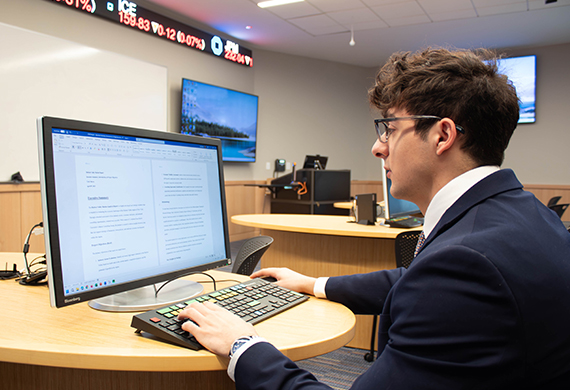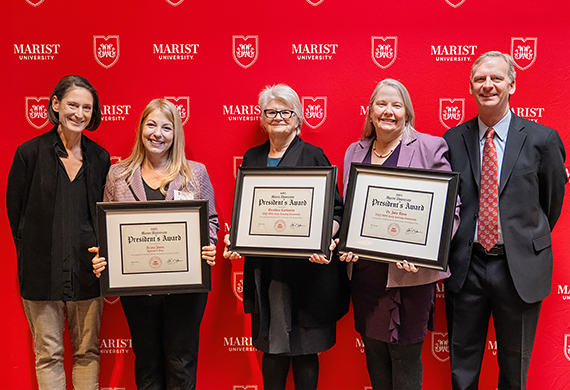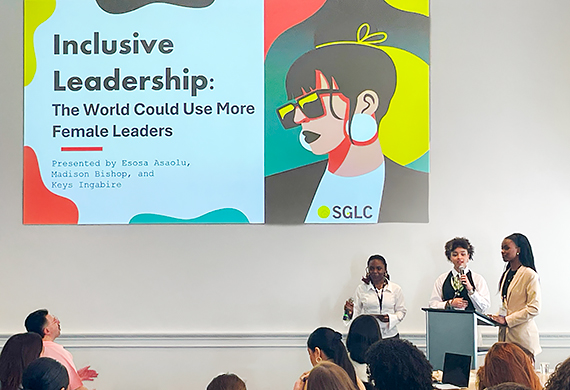A Memorandum from President Dennis J. Murray, July 31, 2020
MEMORANDUM TO THE MARIST COLLEGE COMMUNITY
FROM: DENNIS J. MURRAY
DATE: JULY 31, 2020
I am writing to outline some of the concrete steps Marist is taking to live up to its ideal of being an inclusive community. As was previously announced, Board of Trustees Chair Ross Mauri ’80 formed a Board-level Diversity & Inclusion Committee to hear the concerns expressed by members of the Marist community and to identify specific actions the College can take to do better. The Committee is now in place and is being led by Trustee Dr. Stan Harris, M.D., who graduated from Marist in 1968 and also received a master’s degree in communication from the College in 2006. Stan is a distinguished physician who has had a long career as a health care executive. He is passionate about diversity and inclusion and believes strongly that this group should listen, become educated, and take action. We are very fortunate that Stan has agreed to serve as chair. He is being joined on the Committee by a number of Trustees, including Alumni Association President Eileen Altobelli ’82, Laurie DeJong ’87, Rob Dyson, Brother John Klein ’70, Chris McCann ’83, Genine McCormick ’88, Alvin Patrick ’86, Jerome Pickett ’98, Brother Sean Sammon ’70, and Denise Vanech P’18. The Committee and the entire Board of Trustees will be carefully monitoring the College’s progress on diversity and inclusion issues.
The College has received hundreds of thoughtful ideas, suggestions, and comments from students, employees, alumni, and friends regarding how to improve the campus culture for people of color. We have heard and given careful consideration to the feedback we’ve received, and will try to respond to as much of it as possible. We are deeply grateful to everyone who cares enough about Marist to help us find ways to be a better institution.
Following are several areas in which the College plans to take both short-term and long-term action.
Being Better Listeners
Among the feedback we have received is the feeling that the concerns of people of color at Marist have not always been adequately heard, and we are committed to changing that dynamic. The Board’s Diversity & Inclusion Committee has begun hearing from a number of constituencies, including students, faculty, staff, and alumni. We have identified about a dozen groups from whom the Committee would like to seek feedback: Red Foxes Against Racism; Student Government Association; Marist Ambassadors/tour guides; Diversity & Inclusion Alumni Advisory Board; Black Student Union; Appreciating Races Creating Opportunities (ARCO); Black Student-Athlete Alliance; Diversity Council; LGBTQ groups; and faculty, staff, and students of color. The Committee is willing to listen to feedback from any student group or individual that would like to be heard. Next week, we are launching a new diversity section on the Marist website, and on it will be a form to submit comments and suggestions to the Board Committee.
It should be emphasized that these listening sessions are designed to continue for some time; this will be an ongoing process of engagement, not a one-time event. The meetings and conversations we have held to date have been extremely helpful as we seek out diverse perspectives on how Marist is being experienced by different members of our campus community.
Faculty and Staff Training
One of the suggestions we received was to institute mandatory training on diversity and inclusion, as well as implicit bias. This is an action we have begun to implement for all members of the Marist community. We believe everyone would benefit from the opportunity to build awareness of personal biases and ways to combat them. Marist’s Vice President for Human Resources will research online training courses, similar to the training already in place regarding Title IX guidelines. These steps will be in addition to the diversity experts and coaches we already invite to campus on a regular basis.
We have also funded an innovative proposal called the Marist College Diversity Leadership Institute (MCDLI), which was created by Associate Professor of Psychology Stacy A.S. Williams. The MCDLI is designed to train faculty and staff members in three aspects of diversity development: awareness, application, and action. Once trained, these facilitators will be able to implement or sustain diversity and inclusion initiatives on the Marist campus.
Student Training
It’s equally important that students are trained in cultural competence. In addition to requiring that students participate in campus-wide diversity and implicit bias training, incoming freshmen will continue to have anti-bias programming through Orientation, and we will look to strengthen it. The Emerging Leaders Program will also reinforce its diversity-related programming to prepare students better to engage with the world around them.
Curriculum
Making changes to Marist’s curriculum was one of the most frequent suggestions we received, and we will conduct a comprehensive review of the curriculum. Many specific programs, such as Criminal Justice, History, Political Science, Social Work, and Education, among others, already have a required course in cultural diversity. In the near term, we will ask the faculty to consider instituting a mandatory diversity class that will be required of all students before they graduate. Over the past few years, new academic programs have been introduced or redeveloped, e.g., African Diaspora Studies and Latin American and Caribbean Studies. Additionally, a new academic program in Social Justice is slated to start in 2020-21. Each year, there is a common read for first-year students, and the majority of the books chosen have focused on race. We are also considering the suggestion that Marist implement a campus-wide common reading regarding racism and will research ways to put this idea into practice.
It should be noted that Marist will continue to emphasize diversity in the speakers and presentations we bring to campus, particularly through our ongoing Understanding Race Lecture Series. In the last several years alone, we are proud to have hosted Cornel West, Michael Eric Dyson, Michelle Alexander, Ibram X. Kendi, Bakari Sellers, and Reyna Grande. This fall, we had been planning to host Yusef Salaam, one of the exonerated Central Park Five, but the pandemic has unfortunately necessitated the cancellation of that event.
Analysis of Hiring Patterns and Making Improvements
Diversity in hiring is the hallmark of any good organization, and the College is committed to thoroughly analyzing its hiring practices at all levels and in all operational areas, including senior positions, staff, and faculty. Once we have completed this analysis and established a baseline, we will strive to make improvements, particularly in areas that lack diverse representation. We have begun this analysis and are pleased to share that at 20 percent, Marist leads our group of 30 US News private comparator institutions in the number of faculty of color. As welcome as this news is, we readily acknowledge that there is still work to be done in terms of increasing the number of Black and other historically underrepresented faculty members at the College. One of our top short-term priorities is to endeavor to hire a replacement for our Cabinet-level position focusing on diversity, inclusion, and community engagement (the position previously held by Freddy Garcia).
Better Analysis and Sharing of Data
As we analyze hiring patterns at the College, we believe it is also important to review and share publicly available data on academic progress rates, graduation rates, and other indicators of student success. Again, we believe it is important to establish a baseline from which we can improve. It’s equally important to share the areas in which we’ve made good progress. For example, our first-year retention rates and graduation rates for Black students are well above the national average. Nonetheless, there is still more work to be done in this area.
Admissions
Marist is strongly committed to continuing our efforts to diversify the student body. We have been test-optional for years and have engaged in proactive outreach to build a pipeline of students of color. In fact, the College commits a substantial portion of its institutional assets to recruit and provide financial aid to students from underrepresented backgrounds. And these efforts have paid off – in the last decade, the percentage of students of color in Marist’s incoming freshman class has increased from 14 percent to approximately 22 percent in this year’s class. In particular, the percentage of Black students and multiracial students who identify as Black has increased from three percent to seven percent during this time. We would like to see this success continue and are reviewing all of our enrollment practices to allow us to make additional improvements.
Fundraising and Grants
We are redoubling the College’s fundraising efforts, placing a strong emphasis on endowed scholarships in our next capital campaign. Our grants offices have also been instructed to focus on opportunities for research in the areas of diversity, equity, inclusion, and anti-racism.
Mentoring and Pipelines
In addition to recruiting diverse students, Marist is also committed to developing talent among our faculty and staff in order to increase the number of people of color in leadership positions. For years, we have had in place an Opportunity Hire Program to bring in faculty from underrepresented groups, and we are asking the academic deans to take full advantage of this program. In addition, we will make best efforts to create opportunities for doctoral candidates and postdoctoral scholars from underrepresented groups. Through the Office of the President’s Presidential Fellow Program, young professionals of color serve on Marist’s Cabinet and learn about higher education administration and policy-making at the highest levels. Mark Palmer ’20 is the latest in a long line of talented people to hold this role. This year, we are creating two internship opportunities for students of color in the areas of information technology and construction management, fields that have both traditionally lacked diversity. Students selected for these opportunities will be working directly with our Vice President for Information Technology and Director of Physical Plant, respectively. We will also explore the idea of creating additional alumni mentoring programs, such as the one that already exists in Marist’s School of Management.
Process for Investigating Bias
Every member of the Marist community has the right to feel welcome here, and it’s imperative that any instances of bias or discrimination be reported and investigated. Marist has long had a system in place to handle these issues. Students are strongly encouraged to report all bias incidents to the Vice President for Student Affairs so that complaints may be handled through the Office of Student Conduct. There is also an anonymous reporting system that students can utilize. (It’s important to note that federal law, through the Family Educational Rights and Privacy Act, prevents us from publicly disclosing the results of individual student conduct investigations.) Complaints involving faculty should be routed through the Vice President for Academic Affairs, and issues involving administrators and staff members should be reported to the Vice President for Human Resources. While there are clear processes in place, we are also committed to reviewing our procedures to see if there is room for improvement, either in the way complaints are handled or in the way the process is communicated to members of the Marist community.
Presidential Search
As you know, the Board has begun the process of searching for the College’s next leader. Board Chair Ross Mauri has clearly stated that the Presidential Search Committee he will appoint will be a diverse one, with representatives from various ethnic and constituency groups. The Board is also committed to seeking a diverse pool of qualified candidates from which to choose.
Continue and Expand Commitment to the Local Community
Marist is committed to continuing and expanding our support for inner-city populations in our region, paying particular attention to Poughkeepsie. Because of our location, Marist feels a special obligation to engage with the Poughkeepsie community and support initiatives that serve its residents and promote the city’s development. The College has been a longtime supporter of the Catharine Street Community Center, Family Services, and many other community organizations. Most recently, the College has become part of the Poughkeepsie Children’s Cabinet, which is City of Poughkeepsie Mayor Rob Rolison’s initiative to bring together school districts, government agencies, child-serving community organizations, and other local stakeholders to improve collaboration and coordination of youth supports and services. We are also very proud of the excellent work done in the community by our Center for Civic Engagement and Leadership, Center for Social Justice Research, and Campus Ministry.
These community efforts are in addition to Marist’s continued commitment to the Liberty Partnerships Program, Upward Bound, and the Newburgh Early College High School Program, all of which focus on the educational needs of inner-city youth. While Poughkeepsie is our primary focus, we are proud to be part of efforts to help students in Kingston and Newburgh as well.
Marist wants to be a good neighbor and going forward, we will review our contracting and purchasing practices to ensure that local businesses owned by minorities, women, and veterans are well represented. In addition, we will encourage more faculty and staff to live in the City of Poughkeepsie and explore ways to incentivize their residency there.
Conclusion
This memorandum and the work of the Board’s Diversity & Inclusion Committee have initially focused on issues related to Black Americans, and that is a deliberate choice. Black Americans have been uniquely disadvantaged over the centuries, and they continue to experience unique challenges as a result of systemic racism. We also understand that the experience of other groups is worthy of careful thought and reflection, and we want all community members to feel welcome at Marist: people of different races, ethnic groups, religions, sexual orientations, and political views, as well as women, veterans, and those with disabilities. We believe everyone should experience the same warm sense of community of which we’re so proud. It should also be emphasized that the efforts outlined in this memorandum are merely a starting point. In this spirit, both the Committee and the College are open to considering other ideas and topics that are brought forward.
In conclusion, the last two months have been an extraordinary time, both for our country and for Marist. Nationwide protests have shone a much-needed light on the reality of structural racism in America and the everyday challenges experienced by people of color. Our collective obligation is to face the problem of racial injustice head-on, no matter how difficult the conversation or uncomfortable the revelation. We must take on this obligation with a strong sense of dedication and clarity of purpose, and Marist is committed to doing so. Change begins at home, and at this unique moment in history, Marist will endeavor to do its part to bring about transformative change to our College community. We look forward to reporting back to you on the initiatives we’re undertaking to make Marist a place where everyone feels welcome, valued, and heard.



